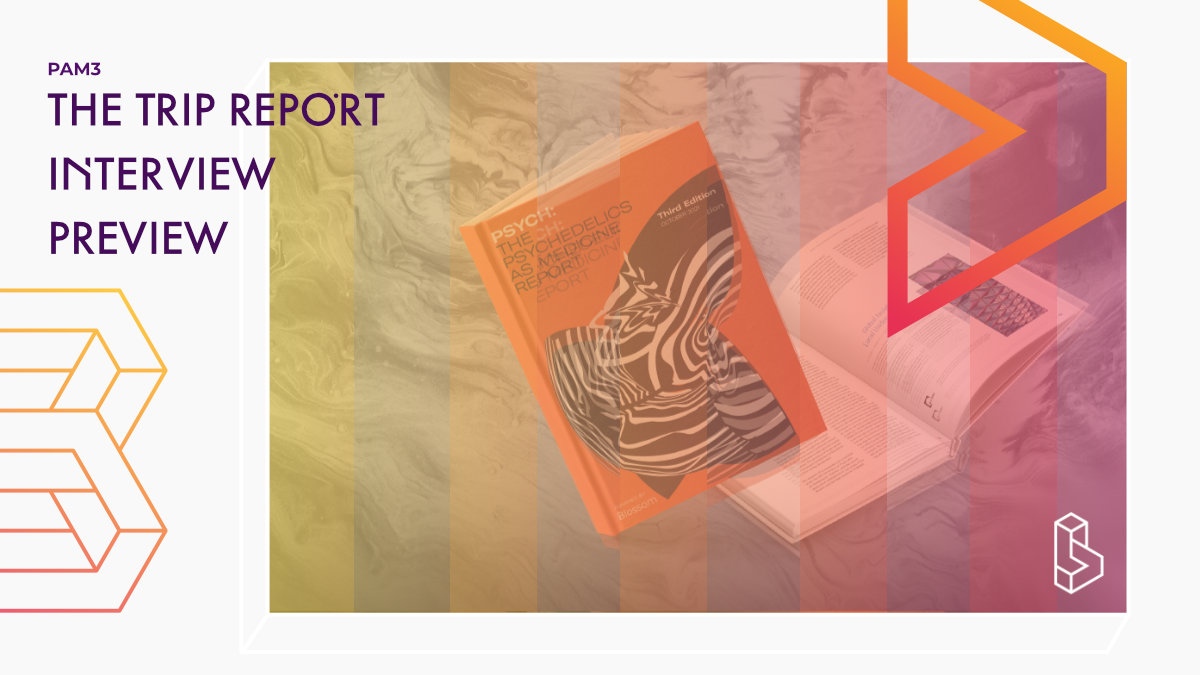KEY QUOTES
The hurdle before us is making PAT safe, accessible, and deployable at scale
If this technology delivers on the promise we would see an overhaul of psychiatric disease classifications with greater emphasis on objective biometric markers
Drug-software combination products will offer possibilities for psychedelic companies to create combination products that they can patent
Zach Haigney
In August 2021, Blossom interviewed Zach Haigney, from The Trip Report, for the Psychedelics as Medicine Report – Third Edition. Zach shared his unique vision of how psychedelics and technology intersect. He argues that both areas are undergoing massive changes where technology will enable psychedelics to be implemented, as medicine, at scale.
Why is the intersection of technological innovation and psychedelic medicine so important?
There are two parts to this answer, one practical, the other technical. Practically, there is a massive unmet need in mental healthcare, and psychedelics seem to offer a transdiagnostic treatment option. This means that in combination with therapy, the same molecules show promise in treating symptoms across health indicators, from PTSD to substance use disorders. The technical challenge is the massive constraint on the scalability of psychedelic-assisted therapies (PAT). At this time, two costly therapists have to be with a patient for at least eight hours, usually two to three of these sessions. Next to the therapy session with psychedelics, most protocols also include four to twelve preparation and integration meetings. The hurdle before us is making PAT safe, accessible, and deployable at scale.
If we take a broader view, we already see technological innovation and mental health care intersect. Digital Health Tech (DHT), or digital therapeutics (DTx), is at an inflexion point where the technology is good enough to become a viable option. A silver lining of the COVID-19 pandemic is that it has shown telemedicine to be a tool in the physician’s toolbox. Beyond telemedicine, we’re seeing the quality and adoption of trackers in smartphones and wearables such as the Apple Watch and Fitbit increase exponentially over the last few years. The rise in real-world data and real-world evidence in drug development and discovery enables better research and development. Patient care and monitoring will also benefit from real-time tracking and data analytics.
Outside PAT, companies are already using passive data from smartphones and wearables, such as steps and heart-rate variability, to relay health information. Digital phenotyping, coined only in 2016, is another name for this type of data collection, and the goal is to make behavioural and mental health more objective. We are already seeing the first psychedelic applications that support and help people with their psychedelic journeys.
In your reporting for The Trip Report, you’ve described drug-software combination products. Can you tell us how this applies to psychedelics as medicines?
Drug-software combination products (DSCP) combine the strengths of a specific drug and a technology like a mobile application, to create better treatment outcomes. For instance, to reduce A1C levels in diabetic patients through monitoring software and the release of drugs. Another example of DSCP is the combination of an Apple Watch and biometrics-based insights, which can help lower blood pressure.
This combination will offer possibilities for psychedelic companies to create combination products that they can patent. A whole slew of biometrics may go into formulating the optimal dose, or the optimal moment, when someone takes a dose of psilocybin. Or conversely, when not to engage in PAT if biomarkers are showing raised blood pressure.
There are, rightly, concerns about tracking all this information. The privacy of a patient needs to be protected from leaks and hacks. Privacy concerns are already heightened when it concerns data on mental health and will be even more so when psychedelics, legal or not, are involved. The current conversation about who owns medical data is a big ball of confusion that needs untangling before successfully implementing PAT with DSCP.
What exciting developments do you see happening with psychedelics and technology in the next 5 to 10 years?
Technology could allow for more objective measures of mental health and well being than is currently captured by surveys or the perception of clinicians. If this technology delivers on the promise we would see an overhaul of psychiatric disease classifications with greater emphasis on objective biometric markers. This is the premise of the US National Institute of Mental Health’s (NIMH) Research Domain Criteria (RDoC). The latter provides a multivariable, biologically-based, rather than symptom-based, framework for understanding mental disorders, and the vision is that the research framework will be able to offer personalised mental health care at scale.
There are four areas where psychedelics and technology are intersecting: diagnosis and symptom management; care delivery, with increased precision in the administration and observation of patients; preparation and integration, by offering anything from health checklists to personalised questions and feedback and through technology before, during, and after PAT.
DHT is up for a challenge in all of these areas to prove that it works better than what is out there already. There is a narrow band in which PAT and DSCP can exist. They will need to offer advantages over traditional treatments without compromising the privacy of patients.
The Psychedelics as Medicines Report continues the reporting with insights on:
- Routes to market, if going through FDA approval is the right path for each company
- The inflection point that VR technology is going through and the three ways this intersects with psychedelics
- How investors can identify emerging trends and opportunities in the space
Become a psychedelic insider
Get a Pro Membership to enjoy these benefits & support Blossom📈 full reports on Topics & Compounds
🧵 full summary reviews of research papers
🚀 full access to new articles
See Memberships

